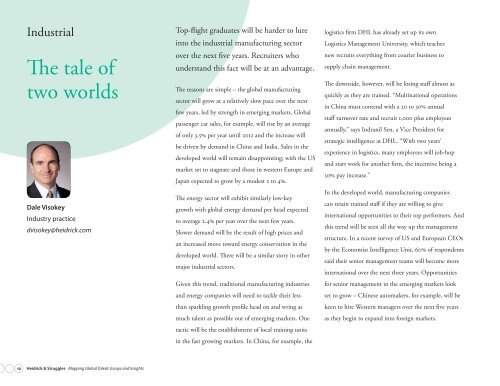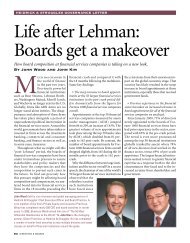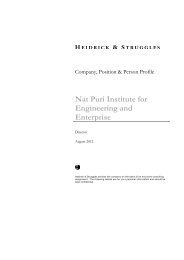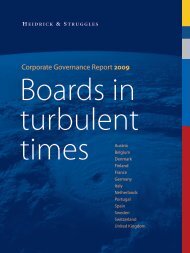Mapping Global Talent: Essays and Insights - Heidrick & Struggles
Mapping Global Talent: Essays and Insights - Heidrick & Struggles
Mapping Global Talent: Essays and Insights - Heidrick & Struggles
You also want an ePaper? Increase the reach of your titles
YUMPU automatically turns print PDFs into web optimized ePapers that Google loves.
1<br />
Industrial<br />
The tale of<br />
two worlds<br />
Dale Visokey<br />
Industry practice<br />
dvisokey@heidrick.com<br />
<strong>Heidrick</strong> & <strong>Struggles</strong> <strong>Mapping</strong> <strong>Global</strong> <strong>Talent</strong>: <strong>Essays</strong> <strong>and</strong> <strong>Insights</strong><br />
Top-flight graduates will be harder to lure<br />
into the industrial manufacturing sector<br />
over the next five years. Recruiters who<br />
underst<strong>and</strong> this fact will be at an advantage.<br />
The reasons are simple – the global manufacturing<br />
sector will grow at a relatively slow pace over the next<br />
few years, led by strength in emerging markets. <strong>Global</strong><br />
passenger car sales, for example, will rise by an average<br />
of only 3.5% per year until 2012 <strong>and</strong> the increase will<br />
be driven by dem<strong>and</strong> in China <strong>and</strong> India. Sales in the<br />
developed world will remain disappointing; with the US<br />
market set to stagnate <strong>and</strong> those in western Europe <strong>and</strong><br />
Japan expected to grow by a modest 2 to 4%.<br />
The energy sector will exhibit similarly low-key<br />
growth with global energy dem<strong>and</strong> per head expected<br />
to average 2.4% per year over the next few years.<br />
Slower dem<strong>and</strong> will be the result of high prices <strong>and</strong><br />
an increased move toward energy conservation in the<br />
developed world. There will be a similar story in other<br />
major industrial sectors.<br />
Given this trend, traditional manufacturing industries<br />
<strong>and</strong> energy companies will need to tackle their less<br />
than sparkling growth profile head on <strong>and</strong> wring as<br />
much talent as possible out of emerging markets. One<br />
tactic will be the establishment of local training units<br />
in the fast growing markets. In China, for example, the<br />
logistics firm DHL has already set up its own<br />
Logistics Management University, which teaches<br />
new recruits everything from courier business to<br />
supply chain management.<br />
The downside, however, will be losing staff almost as<br />
quickly as they are trained. “Multinational operations<br />
in China must contend with a 20 to 30% annual<br />
staff turnover rate <strong>and</strong> recruit 1,000 plus employees<br />
annually,” says Indranil Sen, a Vice President for<br />
strategic intelligence at DHL. “With two years’<br />
experience in logistics, many employees will job-hop<br />
<strong>and</strong> start work for another firm, the incentive being a<br />
50% pay increase.”<br />
In the developed world, manufacturing companies<br />
can retain trained staff if they are willing to give<br />
international opportunities to their top performers. And<br />
this trend will be seen all the way up the management<br />
structure. In a recent survey of US <strong>and</strong> European CEOs<br />
by the Economist Intelligence Unit, 60% of respondents<br />
said their senior management teams will become more<br />
international over the next three years. Opportunities<br />
for senior management in the emerging markets look<br />
set to grow – Chinese automakers, for example, will be<br />
keen to hire Western managers over the next five years<br />
as they begin to exp<strong>and</strong> into foreign markets.
















